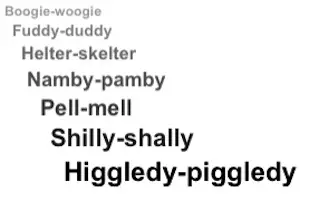- teensy-weensy
- zhick-flick
- zig-zag
- knick-knack
- namby-pamby
- bee's knees
- heebie-jeebies
- Willy-nilly
- Boogie-woogie
- Chick-flick
- Chock-a-block
- Easy-peasy
- Fuddy-duddy
- Fuzzy-wuzzy
- Hanky-panky
- Happy-clappy
- Harum-scarum
- Heebie-jeebies
- Helter-skelter
- Higgledy-piggledy
- Hob-nob
- Hocus-pocus
- Hodge-podge
- Hoity-toity
- Hokey Cokey
- Hokey-pokey
- Hoochie-coochie
- Hubble-bubble
- Hugger-mugger
- Hurly-burly
- Itty-bitty
- Jeepers-creepers
- Jiggery-pokery
- Lardy-dardy
- Lovey-dovey
- Mumbo-jumbo
- Namby-pamby
- Nitty-gritty
- Okey-dokey
- Oompa Loompa
- Pell-mell
- Piggy-wiggy
- Raggle-taggle
- Razzle-dazzle
- Roly-poly
- Rootin' tootin'
- Rumpy-pumpy
- Super-duper
- Teensy-weensy
- Topsy-turvy
- Walkie-talkie
- Willy-nilly
- Bada-bing
- Bish-bosh
- Chit-chat
- Criss-cross
- Crinkum-crankum
- Dilly-dally
- Knick-knack
- Shilly-shally
- Zig-zag
- Ack-ack
- Yada-yada
- Tic-tac-toe
- Bish-bash-bosh
Reduplication in language is the joining of two words to make a short, usually hyphenated, phrase. This is done for emphasis – for example, ‘teensy’ means tiny, but ‘teensy-weensy‘ sounds tinier still.
Reduplication might be rhyming, as in chick-flick, or ablaut (that is, using vowel substitution), as in the alliterative zig-zag. There are also exact reduplications, where a term is formed by repeating a single word, for example housey-housey,
The typical way that a reduplicated two-word pair is formed is by this recipe:
Take an existing word with a known meaning, or a variant of it.
Either, add a rhyming or alliterative word, or repeat the first word.
The added word usually goes after the first, although there are a few reduplicants where the added word goes before – for example knick-knack.
The coinage of reduplcated phrases is often done just for fun and the undoubted pleasure to be had from playing with words..
There are numerous alliterative and rhyming idioms and these are a significant feature of the language. These aren’t restricted to poets and Cockneys; everyone uses them. We start in the nursery with choo-choos, move on in adult life to hanky-panky and end up in the nursing home having a sing-song.
Sometimes the second word has little meaning in itself and is never seen out alone, only existing as part of a reduplicate pair – for example namby-pamby.
New coinages often appear at times of national confidence, when an outgoing and playful nature is expressed in language. A good example of this came about in the 1920s, following the First World War, when many nonsense word pairs were coined – the bee’s knees, heebie-jeebies etc.
The introduction of such terms began with Old English and continues today. Willy-nilly is over a thousand years old. Recently we have boob-tube and hip-hop.
Here are some examples, there are many more:
Rhyming:
Many of these rhyming reduplications start with the letter H. Why? I don’t know.
Ablaut:
These are phrases suggestive of a toing and froing motion, that is, indicating a thing which is this and then that; for example, ding-dong, see-saw, tick-tock, zig-zag.
Almost all of these use the vowel ‘i’ in the first part of the reduplication and either ‘a’ or ‘o’ in the second part. Again, I don’t know why.
Ding-dong
Fiddle-faddle
Flim-flam
Mish-mash
Ping-pong
Pitter-patter
Riff-raff
See-saw
Sing-song
Tick-tock
Tip-top
Tittle-tattle
Wishy-washy,
Exact:
These are simple expressions formed by repeating a word. These repeated word reduplications are often used as baby talk – gee-gee, choo-choo etc.:
Aye-aye
Bye-bye
Chin-chin
Choo-choo
Chop-chop
Ga-ga
Gee-gee
Goody-goody
Housey-housey
Knock-knock
Night-night
Yum-yum
Triple Ablaut
The extension of reduplications is rare and seems to be done just for the fun of it. They are all of the form ‘i’, ‘a’, ‘o’, probably just because they sound better that way – for example, tac-toe-tic just doesn’t seem to work.
Bing-bang-boom
Ning-nang-nong
Splish-splash-splosh
I’ve not yet recorded a 21st century reduplication. ‘Bieber Fever’ and ‘stitch ‘n bitch’ are certainly 21st century, but aren’t quite reduplications.

